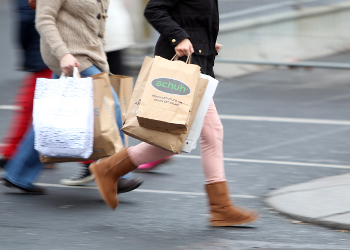Almost 60% of workers in retail and hospitality concerned about job security; Jobs.ie research

Almost 20% of retail and 9% of hospitality workers have not returned due to personal or family health concerns around Covid-19
19 November 2020
Almost 60% of workers in the retail and hospitality industries say that they are concerned about the security of their job in the weeks and months ahead, according to new research by e-recruitment platform, Jobs.ie.
The results demonstrate the deep concern of workers in the retail and hospitality industries, the two sectors most impacted by the current and previous Covid-19 restrictions.
Concern for the future
For workers in both sectors, a shared concern arises around the future of the industry, with six in 10 (60%) workers in both hospitality and retail expressing worry for the security of their job in the weeks and months ahead.
When asked if the Covid-19 pandemic had made them reconsider a future career in the industry, all retail and hospitality workers surveyed (100%) said yes.
In retail, almost four in 10 (39%) workers said that they could not be certain of future job security and almost three in 10 (27%) do not think that there will be enough opportunities to progress their career in the sector.
In hospitality, over half (54%) of workers said that they could not be certain of their job security, and two in 10 (21%) said they will not earn enough to live if they stay working in the industry. Opportunities to progress were less of a concern for this sector, with just 17% citing this as a factor in their decision to reconsider careers.
Working through the pandemic
68% of retail workers and 61% of hospitality workers surveyed say that they have been able to return to work since Covid-19 restrictions began in March, as changes to guidelines during the summer made it possible for some businesses in these industries to continue trading.
Of those who have been able to return to work, almost nine in 10 workers in hospitality (89%) and retail (87%) say that their employer has taken all reasonable steps to protect their health and safety at work.
Despite this, almost two in 10 (19%) retail workers and almost one in 10 (9%) hospitality workers say that they are unable to return to work due to concerns for their personal health, or the health of a family member and the potential of possible exposure to Covid-19.
In some cases, the changing restrictions have prevented employers from offering sufficient hours for workers to sustain a living, with 13% in retail and 20% in hospitality unable to return to full-time work for this reason.
Changing work patterns
The effects of the Covid-19 pandemic and the restrictions in place have prevented many businesses from trading as they normally would.
Of those who have returned to work, 34% in hospitality and 22% in retail have been asked to work shorter hours (< 9-hour days) than they typically would to facilitate these new changes. A smaller percentage (retail – 14%, hospitality – 12%) have been asked to work longer hours (> 9-hour days) than they would have normally worked before the pandemic. The majority of workers in retail (64%) and hospitality (55%) say that they are happy to facilitate this change.
“Today’s data suggests that there is a high risk of many retail and hospitality workers leaving the industry, as the fallout from the Covid-19 pandemic has forced them to reconsider their choice of career. This is extremely worrying and could spell a potential future skills shortage if not addressed,” said Christopher Paye, general manager at Jobs.ie.
“Collectively, both of these sectors support almost 330,000 jobs, accounting for approximately 16% of total employment,” Paye added. “To safeguard this level of employment and maintain viability within the sector, government and industry must continue to work together ensure that current supports remain in place – but more importantly, that they are revised and updated in line with any further Covid-19 developments.”



 Print
Print






Fans 0
Followers